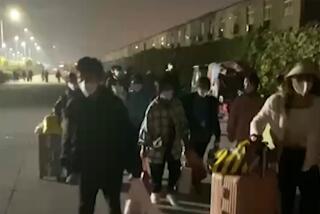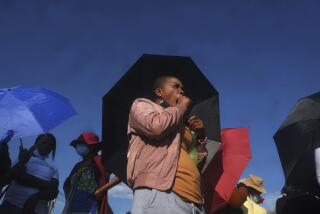Ebola outbreak spurs production of protective suits
- Share via
The Ebola outbreak has sparked demand for protective apparel worn by healthcare workers, causing manufacturers to increase production and speculative investors to boost the stock prices of some companies that make germ-resistant suits, smocks and masks.
DuPont Co. said it is tripling production of protective suits — the ones seen around-the-clock on cable news networks — as it works with the World Health Organization and other agencies to protect those treating Ebola patients in West Africa, Europe and, now, the United States.
------------
FOR THE RECORD:
Protective apparel: An article in the Oct. 17 Business section about demand for suits to protect against the Ebola virus said Kimberly-Clark Corp. does not sell hazardous-materials suits. The company does sell such suits. —
------------
“We have already increased production significantly and we continue to take actions to increase the availability of our garments to those organizations involved in the response,” DuPont spokesman Dan Turner said.
Hospitals across the United States are ordering protective suits as preparation for potential Ebola cases, and health officials say they may need millions of protective gowns to deal with the crisis.
Investors are also moving into action.
In a frenzied week of trading, investors drove up the stocks of smaller companies that specialize in hazardous materials clothing. Lakeland Industries Inc. of Ronkonkoma, N.Y., saw its stock climb 248% from Oct. 2 to Oct. 13; shares of Alpha Pro Tech Ltd. in Ontario, Canada, soared 219% between Oct. 6 and Oct. 13.
The stocks jumped Wednesday on news that a second nurse at Texas Health Presbyterian Hospital had been infected with Ebola after treating Liberian Thomas Eric Duncan, who died Oct. 8. On Thursday, Lakeland Industries’ stock fell $2.91, or 12%, to $20.69. Allied Pro Tech dropped $1.54, or 18%, to $6.83.
Some Wall Street observers don’t expect those stocks’ meteoric gains to last.
Lakeland Industries “is a short-term speculative Ebola play, nothing more,” said John Divine, assistant editor of InvestorPlace, a financial news and investing website in Rockville, Md. “It’s being sensationalized in the media right now and their stock is reaping the rewards from that.”
The deadly virus is spread through direct contact with blood or body fluids of a person who is sick with Ebola, according to the Centers for Disease Control and Prevention.
More than 4,000 people in West Africa have died of Ebola in the current outbreak. Of those, more than 200 have been health workers.
So far, manufacturers say they have been able to meet demand for the protective suits, masks, glasses, gloves and shoe covers that nurses and doctors must wear to avoid contamination while treating Ebola patients.
But demand could grow. The World Health Organization said Tuesday that the number of new Ebola cases could reach 10,000 a week by December. That could expand the already heavy demand for protective wear. In September, world health officials said they would need more than 3 million pieces of high-quality protective gear to deal with the Ebola crisis.
DuPont has been working for months with the WHO and other organizations “to address the demand for our personal protection garments in the impacted region,” Turner said.
He declined to say how many protective gowns DuPont has produced since the outbreak surfaced, “as we consider this as competition sensitive information.”
Kimberly-Clark Corp. does not make hazardous-materials suits, but it does sell protective gear such as masks, gloves, eyewear and shoe covers that would be used by health workers treating patients with Ebola.
Judson Boothe, senior global manufacturing director for Kimberly-Clark’s health unit, said the company has seen “heightened demand” since the first Texas health worker was diagnosed with Ebola, but it is not yet facing supply issues.
“Is there a limit? Yes, there’s a limit,” Boothe said. “If demand gets to a point it outstrips capacity, there would be a shortage. But it’s very far away from that right now. It would have to be pretty widespread to create a shortage.”
California hospitals are concerned about a shortage of protective apparel “in the event of a large outbreak” of Ebola in the United States, the California Hospital Assn. said in a letter Tuesday to Sen. Barbara Boxer.
National Nurses United on Wednesday asked President Obama to order all U.S. hospitals to meet high standards in protecting health workers treating Ebola patients, including issuing full-body hazardous materials suits.
Lakeland, the New York company that sells protective apparel for healthcare workers, declined to discuss the level of demand for its products, which are manufactured in China.
In September, Lakeland chief Christopher J. Ryan said in a news release that the company was increasing its manufacturing capacity “and stands ready to join the fight against the spread of Ebola.”
“Despite reports citing the short supply of protective suits for handling hazardous materials … Lakeland has appropriately qualified and certified suits, ample manufacturing capacity and numerous distribution points to supply these garments,” Ryan said.
Times staff writer Alan Zarembo contributed to this report.
Twitter: @spfeifer22
More to Read
Inside the business of entertainment
The Wide Shot brings you news, analysis and insights on everything from streaming wars to production — and what it all means for the future.
You may occasionally receive promotional content from the Los Angeles Times.











